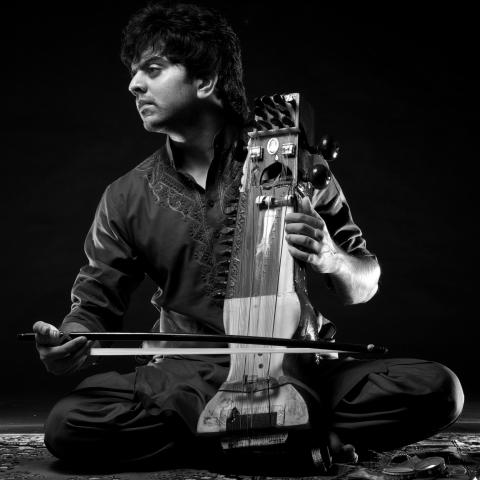
Suhail Yusuf Khan
Suhail Yusuf Khan is an Indian sarangi player who joins the Berklee Indian Ensemble in concert on May 9, 2017. Known for his fusion of rock and Indian classical music, Khan sat down with Berklee Indian Ensemble member and student Amira Gill for an interview.
How did you start playing the sarangi?
I almost feel as though it wasn’t me who chose the sarangi, but the sarangi chose me. The sarangi has been a part of our family for generations. My maternal grandfather (Sabri Khan) was a sarangi legend and one of the greatest sarangi players of India. I started living in his house when I was very young, and I saw how musicians from all over would travel to our house and live with my grandfather under the guru-shishya parampara, which literally translates to student-teacher tradition. I was amazed and overwhelmed by the musicianship that constantly flooded our home. At 7 years old, in a traditional ceremony, my grandfather and uncle tied a sacred thread on my right hand and accepted me as their student. From this point on, they were no longer just my uncle and grandfather: they were my gurus.
Can you tell us a little more about your training under the guru-shishya parampara?
Under the guru-shishya parampara, I was taught music as a lifestyle. I lived under the same roof as my guru, went to my guru’s concerts, carried his instruments, and subconsciously picked up on important aspects of his musicianship without being explicitly told to. I had to do everything that was demanded of me. This meant waking up at 4:00 a.m. to make him tea, massaging his feet and back, cleaning the instruments, and doing anything and everything that he needed. For an 8 year old, this was torturous. There were days when I practiced for hours on my own, with no agenda as such, and then there were days when I was woken up at the crack of dawn because my grandfather remembered a composition he needed me to learn instantly. Much of my learning was outside the practice room. We would go for walks together, and he would tell me stories about his performances, anecdotes about the thousands of amazing things that have happened to him, his struggles—and they were incredibly educational.
What has your experience collaborating with non-Indian classical musicians been like?
I remember stepping into the world of Western music during a college competition I was asked to play in. I was taken aback when they asked me to play "Wake Up" by Rage Against the Machine. I had never heard of this band before; at home I was touching my guru’s feet, learning Raag Malkauns, learning about spirituality and devotional music, and suddenly I was exposed to music that was aggressively talking about the horrible political situations in the world. That was my first experience of the kind, and I absolutely loved it. This experience gave me a newfound confidence to experiment. Soon after, I joined Artistes Unlimited, run by Annette Philip, and numerous other collaborative projects outside of the Hindustani classical circuit. However, even while working with Western music styles and instruments, I never stopped playing Indian classical music. Think about it this way: I am wearing Western clothing, but my body is Indian. I am talking to you in English, but my thought process is translating from Hindi/Urdu to English. Similarly, when I play with Western musicians, my thought process, my terminologies, my sound, my technique is still Indian classical. The overall outcome of the collaboration, however, is a confluence of Western music and Indian classical music. It is up to the listener to decipher or categorize what he or she is listening to.
What are some of the challenges you’ve faced along the way?
I have faced a lot of objections in regards to the styles of music I play. My family never envisioned having a son who would play outside of the traditional Indian classical music circuit. They didn’t understand the concept of jamming, and they dreamt of me becoming one of the busiest Indian classical musicians, touring all over the world, playing at major concert halls. Similarly, a lot of Indian classical musicians started having a problem with what I do. They thought I was sabotaging the status of the sarangi by playing in pubs and rock ‘n’ roll concerts. They thought I was making the instrument unholy. But I had to accept that not everyone will like me and whichever path I choose to tread, in any field of work: resistance was inevitable. I just started focusing on the music. My main objective is to explore and dig deeper. I want to see what I can do and test my limitations. I’m still putting myself into unfamiliar situations and musical experiences because that’s where I grow.